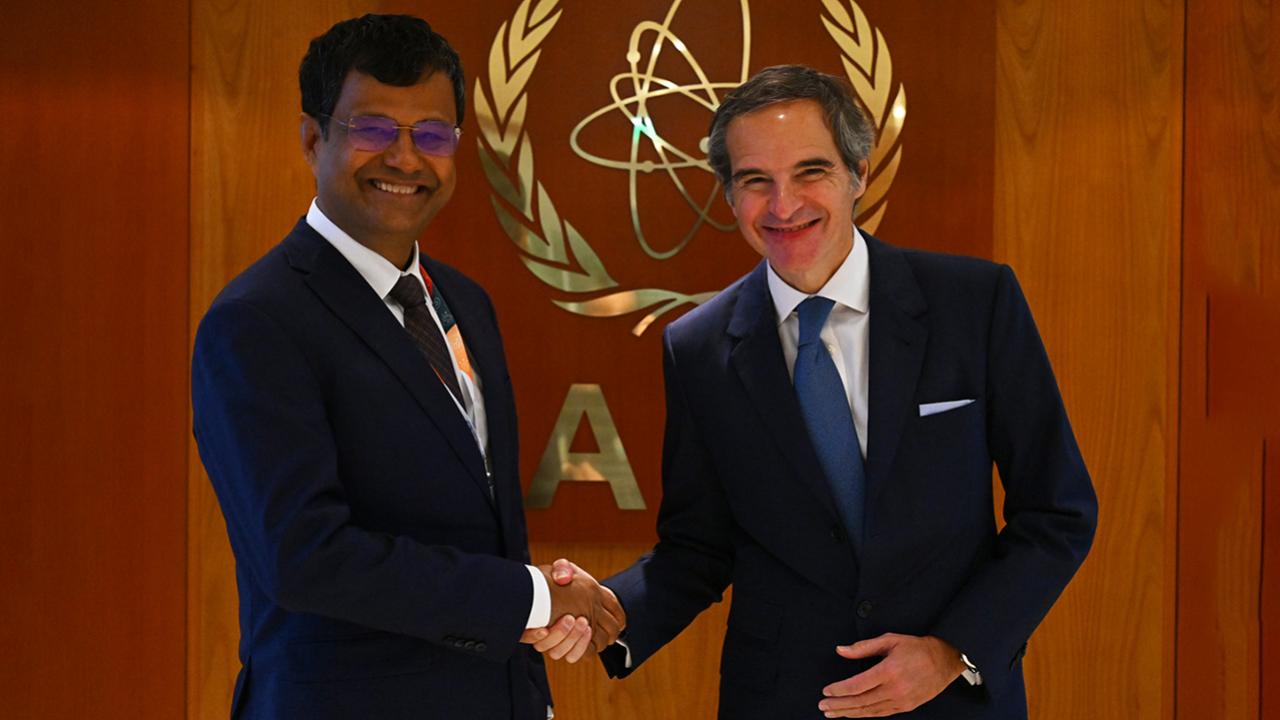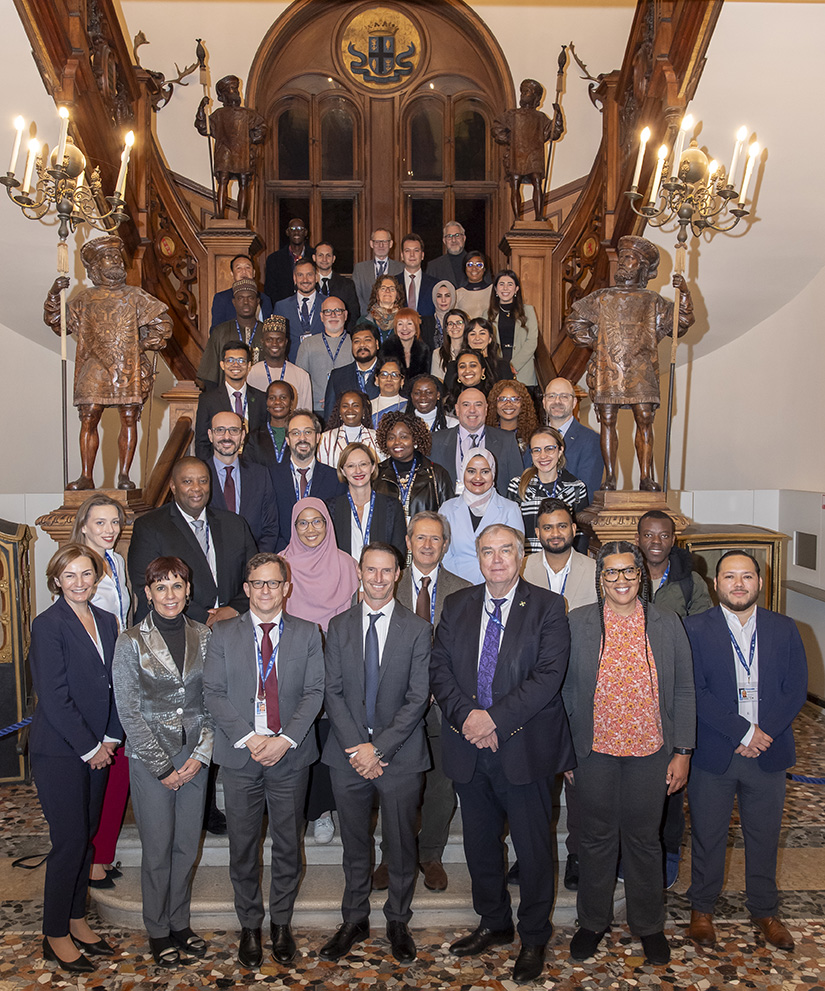
In a year marked by ICTP’s 60th anniversary celebrations, with events taking place across the globe, it was particularly important for the Centre to honour its longstanding collaboration with its UN partner, the International Atomic Energy Agency (IAEA), which has supported the Centre since its very inception.
On Tuesday 26 November, the IAEA hosted a side event to its Ministerial Conference on Nuclear Science, Technology and Applications and the Technical Cooperation, highlighting the impact of ICTP in promoting global scientific collaboration and knowledge exchange, with a focus on the projects that the Centre carries out in collaboration with the IAEA. ICTP's first scientific council meeting was convened by the IAEA in 1964; since then, the joint efforts of the two organisations have offered a variety of activities in support of research, education, training, and capacity building in developing countries.
The side event was promoted by the Permanent mission of Italy to the international organizations in Vienna. Italy, where ICTP is based, is one of the Centre's key supporters, along with the IAEA and UNESCO.
“Italy strongly values one of ICTP’s most significant contributions: the training of young scientists, especially from developing countries,” explained ambassador Debora Lepre, Italy's Permanent Representative to the International Organizations in Vienna, adding “It also actively promotes the South-South collaboration fostered by the ICTP as instrumental to building networks of scientific communities across developing regions, creating lasting global connections for progress.”
Najat Mokhtar, Deputy Director-General and Head of the Department of Nuclear Sciences and Applications at the IAEA, added that, “Since the ICTP’s establishment in the early 1960s, the IAEA has been a proud partner, shaping the Centre’s foundation and its mission to support scientific excellence in developing countries.” In her welcome remarks, Mokhtar highlighted the numerous programmes that ICTP and the IAEA have been working on together, such as coordinated workshops, fellowships, and programmes through which thousands of scientists have been empowered to tackle critical issues in nuclear science and technology, stressing that, “Over the decades, this partnership has grown into a strategic collaboration that bridges gaps in research, education and training.”
The side event brought together international scientists from ICTP's joint programmes with the IAEA who gave testimonies about the impact on their careers. Speakers included representatives from the Synchrotron Light for Experimental Science and Applications in the Middle East (SESAME) in Jordan and the Masters in Medical Physics Programme.
In her keynote lecture, Gihan Kamel, Infrared Beamline Principal Scientist and Team Supervisor at SESAME, highlighted the role that ICTP has played in the SESAME project, also backed by the IAEA. At a time of heightened turmoil in the Middle East, the synchrotron, located in Jordan and built also thanks to the support of Israel, Iran, Turkey and Palestine, is a striking example of scientific cooperation that was created thanks to the initial idea by ICTP founder Abdus Salam. ICTP has been contributing to the project both strategically and by organizing training courses for the scientists working on it.
A key project of the ICTP-IAEA collaboration is the Master in Medical Physics (MMP) programme, run jointly by ICTP and the University of Trieste, and funded directly by the IAEA member states. In 2024 the programme is celebrating its 10th anniversary. The Master is a perfect example of the important contribution that the IAEA and ICTP are making towards peaceful applications of nuclear science. It includes clinical training in radiation oncology or diagnostic and nuclear medicine that takes place in some of the 26 hospitals across Italy where the students carry out their internships.
At the event, Renato Padovani, who coordinates the MMP at ICTP, gave an overview of the programme, while former students Lucía Mariel Arana Peña and Farah Ben Hammouda shared their personal, touching testimonials and the life-changing impact that the programme has had on their lives and careers. Carlo Cavedon, Clinical supervisor of the MMP and President of the Italian Association of Medical Physics, highlighted the longstanding collaboration between the programme and the numerous Italian hospitals that host the students' clinical training every year. Martin Krause, Director of the Division of Programme Support and Coordination at the IAEA's Technical Cooperation Department, closed the session with his final remarks.
During the IAEA ministerial conference, the IAEA Director General Rafael Grossi personally greeted ICTP Director Atish Dabholkar, expressing his appreciation of ICTP’s work as a promoter of global progress in science and of a very successful partnership with the IAEA. That the collaboration between ICTP and the IAEA is strong and fruitful is testified also by the ICTP-IAEA Nuclear Stakeholder Engagement School, that the Centre was hosting during that same week. The inaugural edition of this new training course, designed to enhance understanding of stakeholder engagement as an essential element of a complete nuclear power programme, took place in Trieste from 25 to 28 November.

The school’s opening day concluded with an outreach event at the beautiful Miramare Castle, a short walk away from ICTP’s headquarters. Charles Oppenheimer, grandson of physicist J. Robert Oppenheimer, took part in a panel discussion on opportunities and challenges in expanding the use of nuclear power worldwide, with a focus on social license. The speakers included Aleshia Duncan, Deputy Assistant Secretary for International Cooperation in the Office of Nuclear Energy, US Department of Energy, Stefano Monti, president of the Italian Nuclear Association and the European Nuclear Society, and Meritxell Martell, executive director of the Group of European Municipalities with Nuclear Facilities. They engaged in a fascinating conversation, moderated by Jeffrey Donovan, that inspired a lively Q&A session with the audience.
Oppenheimer, whose grandfather chaired ICTP’s scientific council in the very early days of the Centre, was taken on a special tour of the Centre’s main campus and visited the Oppenheimer Room, whose walls are decorated with historical pictures of the Centre, including some that show Robert Oppenheimer engaging in conversation with Abdus Salam and ICTP co-founder Paolo Budinich. “The IAEA and ICTP are dedicated to the mission of fostering cooperation to reap the benefits of nuclear energy, and I have gained a new appreciation for both organizations this week,” he said, commenting on his experience at the ICTP-IAEA Nuclear Stakeholder Engagement School.
Pictures of the event can be found on ICTP’s Flickr page.
















